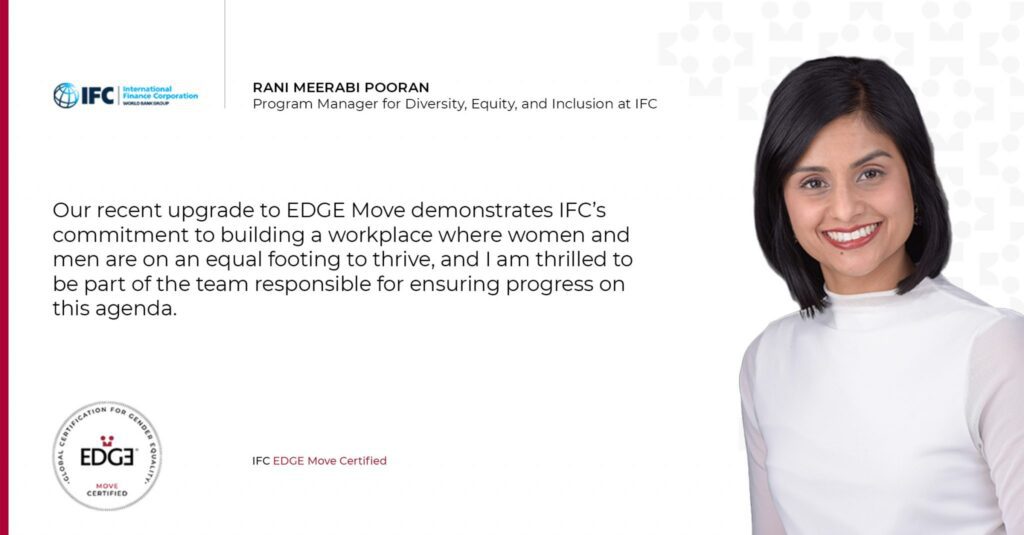The International Finance Corporation (IFC) recently earned the second level of EDGE certification, EDGE Move. This level is given to organizations that have implemented a framework for change and achieved significant milestones after level one (EDGE Assess). IFC attained this because it reached EDGE global standards in key areas after conducting a detailed assessment and undertaking an independent third-party review on gender balance, gender pay equity, policies and practices for equitable career flows, and inclusive workplace culture.
Organizations certified at EDGE Move commit to further refining their action plan and taking measures that result in even greater impact. We spoke to Rani Meerabi Pooran, Program Manager for Diversity, Equity, and Inclusion at IFC, to learn about the organization’s progress and plans to further advance gender equity.

How has the business case for gender balance and diversity, equity, and inclusion (DEI) evolved over the last several years at IFC?
Rani Meerabi Pooran: Starting with our Managing Director, leadership across IFC is keenly aware that organizations with a gender-inclusive workforce perform better – it’s that simple. And the business case for gender equity applies not only to IFC, but also to our clients and projects in which we invest. Beyond the positive impact of closing gender gaps on employee recruitment, retention, and promotion, we know that organizations can reap benefits ranging from higher financial returns to better environmental, social, and governance (ESG) outcomes. Sadly, over the past two years, we’ve witnessed the COVID-19 pandemic set the world back in terms of hard-won gender equality gains. IFC is committed to helping to ensure we don’t have to wait over 135 years to close the global gender gap.
Our recent upgrade to EDGE Move demonstrates IFC’s commitment to building a workplace where women and men are on an equal footing to thrive, and I am thrilled to be part of the team responsible for ensuring progress on this agenda.
We are proud of the progress we have made in terms of gender balance over the past year. IFC achieved gender parity at the vice-presidency level, increased the share of female senior professionals and managers to 43.4 percent and reached an overall 0.84 Gender Balance Index – a gender-based diversity index with a goal of gender balance (score of 1).
Our next steps include continuing to ensure there is equal pay for equal work for men and women, awareness training on gender biases, the introduction of gender equality objectives into performance evaluation plans for managers, and encouraging men to take full parental leave.
EDGE is not only a rigorous assessment we undertake internally but also an important tool that IFC can suggest to private sector investment and advisory clients. As an accredited licensing partner, IFC has supported the successful certification of 11 companies around the globe, with four more in the process. An example of the positive impact of this partnership is a large manufacturer of baked goods in Brazil that, with IFC’s guidance, strengthened its commitment to gender equity and consolidated its reputation as an employer of choice. Its retention rate for women returning from maternity leave jumped from 57 to 93 percent, and the number of women on the board increased from 11 to 25 percent.
By working with my mentor, I gained new DEI perspectives and ideas to implement on my job, enhanced my interpersonal skills, and got exposure to other units within the organization.
EDGE Certification brings visibility and credibility to the change happening inside the organization. At the same time, it creates the basis for diverse talent to thrive at work. Tell us some stories about how your employees benefit from the EDGE Certification journey of your organization.
Rani Meerabi Pooran: Each time we engage with EDGE, we have an opportunity to identify areas for improvement—for example, coming out of this certification round we discovered an opportunity to better promote parental leave for men.
One new father who benefits from this is Prashant Joshi, our Senior Human Resources Officer, who told us: “The flexibility to break up my paternity leave period was a huge plus for my wife and me. I was able to support my family immediately after my daughter was born and coordinate the remaining time with my wife’s maternity leave. This allowed us to spend more time with our daughter, without having to use services like a day care or a nanny for a good six months.”
Talent development programs like mentorship and sponsorship benefit all participants and the EDGE certification journey has provided insights into how IFC can adapt its model.
IFC created a sponsorship program with a focus on women and staff from Sub-Saharan Africa and the Caribbean. The initiative aims to expand the diversity and readiness of our senior leadership pipeline, create a culture of investing in others, and increase the retention of diverse top talent. Two cohorts have completed the program, and a third cohort is in progress.
One of the sponsors of this program is John Gandolfo, IFC’s Vice President and Treasurer, who said: “I am thrilled to have played a part in the professional development of a strong core of highly skilled and talented women. IFC is one hundred percent committed to gender equality. Achieving gender equality is an ongoing challenge and we must continuously recommit ourselves to achieving our goals.”
Other mentorship initiatives offer new points of view to employees, for example, by having young staff mentor senior colleagues. Macarena De Martini, Operations Analyst, shared: “By working with my mentor, I gained new DEI perspectives and ideas to implement on my job, enhanced my interpersonal skills, and got exposure to other units within the organization.”
What do you think workplace gender balance, diversity, equity, and inclusion mean to the next generation?
Rani Meerabi Pooran: Over 40 percent of IFC’s staff are millennials and they represent the fastest-growing segment of our workforce.
From our millennial cohort, over 23 percent are women and nearly 18 percent are men. Many of them participate in a dedicated Employee Resource Group that was born within IFC’s Women’s Network before becoming an independent community—so gender equity is at the core of the group.
Research shows that younger generations are motivated by a sense of purpose, accountability, and action. And millennials, specifically, have mental health, well-being, and ESG topics at the top of their agendas, which means that DEI is critical to IFC’s brand and employee value proposition. They expect action in the workplace and the community on DEI.
ABOUT INTERNATIONAL FINANCE CORPORATION
IFC—a member of the World Bank Group—is the largest global development institution focused on the private sector in emerging markets. We work in more than 100 countries, using our capital, expertise, and influence to create markets and opportunities in developing countries. In fiscal year 2021, IFC committed a record $31.5 billion to private companies and financial institutions in developing countries, leveraging the power of the private sector to end extreme poverty and boost shared prosperity as economies grapple with the impacts of the COVID-19 pandemic. For more information, visit www.ifc.org.
ABOUT EDGE CERTIFICATION
EDGE is the leading global assessment and business certification for gender and intersectional equity. EDGE Certification involves a rigorous third-party review of representation across the pipeline, pay equity, effectiveness of policies and practices, and inclusiveness of an organization’s culture. As an integral part of the assessment, statistical data is analysed, policies and practices are reviewed and employees’ experiences of career development opportunities in the current workplace are accounted for. Depending on the specific results of each organization, an action plan is formulated, and firm commitments towards its implementation.
EDGE Certification meets organizations where they are in their gender balance journey (EDGE) and in their intersectional equity journey (EDGEplus) through its three levels of certification: Assess, Move and Lead. A certification at the EDGE Assess level recognizes commitment, one at the EDGE Move level showcases progress and a certification at the EDGE Lead level celebrates success in fostering gender equitable workplaces. An EDGEplus certification further recognizing its commitment to analysing intersectional issues between gender and one or several of the following additional dimensions: gender identity, race/ethnicity, LGBTQI+, working with a disability, nationality and age.
EDGE Certification is built around the independent third-party certification of data and information and is distinguished by its rigour and focus on impact granted by one of the EDGE accredited independent third-party certification bodies – SGS, Intertek or FloCert, it remains valid for a period of two years. EDGE’s current customer base consists of over 200 large organizations in 50 countries across five continents, representing 30 different industries.





